The early days of Birmingham, Alabama
Up to the spring of 1873 the town (Birmingham) grew rapidly and had fairly won the title of the Magic City, but about that time the building of houses ceased.
(From Marengo News, Demopolis, Alabama May 24, 1873)
The carpenters and brick masons who had been kept busy for a year and a half in the erection of buildings, found themselves without employment, and as a natural consequence the trade of the merchants fell off.
The financial panic which occurred in Wall Street in the spring of 1873 had a depressing effect upon the whole country, and of course, the young and struggling city felt it keenly. Then followed a very serious epidemic of cholera which appeared in Birmingham in June of this year and which almost entirely depopulated the town. Many residents of Birmingham who had left during the cholera epidemic did not return after it was over, and many nonresident property-holders, believing that the town was a failure, were anxious to sell the property they bought in the new town, but it was difficult to find buyers.
(From Montgomery Advertiser, July 8, 1873)
Gloom had settled like a dark pall
Bats and owls were the sole occupants of many buildings which had been rented by anxious tenants and occupied almost before they were finished, only a year and a half before. The streets, which but a short time before were the scenes of busy industry, were now silent and almost deserted, presenting the usual listless aspect of the typical Southern village. A stranger was rarely seen upon them, and when one did make his appearance he was the “observed of all observers.” Gloom had settled like a dark pall over the young city, while despair had seized upon its people, who were formerly bouyant with hope.
The population of Birmingham, which in the early part of 1873 had been estimated at 4,000, had now dwindled to less than 2,000. The property continued to decline in value.
From the early part of 1873 to 1879-six years-the first period of depression in Birmingham, sales of property by the Elyton Land Company were barely enough to pay interest and office expenses. Improved business property sold during this period for less than one-fourth of the cost of the improvements on it. The stock of the Company continued to decline in value, and its creditors were clamorous for their money.
Colonel Powell called a meeting after a meeting of his Directors and vainly urged them to adopt some plan to relieve the Company of its financial embarrassment. Meanwhile, the debts of the Company were growing larger and larger by the accumulation of interest, and creditors were becoming more pressing. At a meeting of the Directors held November 21, 1873, the President stated that in view of the present financial crisis which had caused an almost complete suspension of the business of the Company, he would remit his salary for the unexpired term of his office and serve them without compensation.
Could not afford salaries
About this time the salary of the Secretary and Treasurer was reduced, and it was decided that the Company could not afford to pay a salary to the Superintendent of the Water Works, and the works were turned over to him to operate, allowing him to receive the entire net earnings as his compensation. During this long period of stagnation in business and depression in values in Birmingham, there was, as a natural consequence great dissatisfaction among the people, who, when prospects were bright had in many instances invested their all in property in the Magic City. Croakers were not wanting who expressed no hope for the future of the city and hesitated not to ascribe to the Elyton Land Company the responsibility for all their woes. Bitter feelings toward the Company were freely indulged in, and the harshest criticisms were heard on every hand of the Company, its officials, and their management.
Elyton Land Company Building on the northeast corner of Morris Avenue and 20th Street North (O. V. Hunt photographer, Samford University Library)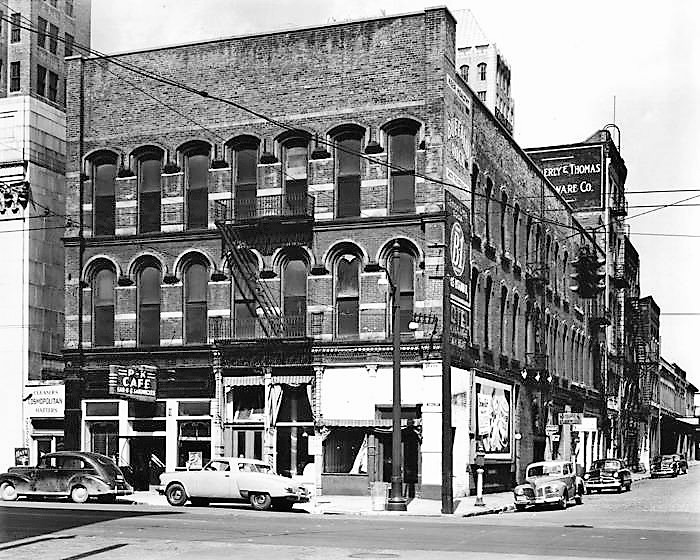
President resigned
In March 1875, Col. Powell resigned the office of President, and Dr. H. M. Caldwell was elected in his stead
At this time the indebtedness of the Company amounted to about $70,000. It had no credit, no money, and nothing to sell except land and water; there was absolutely no demand for the former, and scarcely enough for the latter to pay the cost of furnishing it, and its capital stock would not sell on the market for $15 per share.
Finally, the Elyton Land Company succeeded in funding its debt. In August, 1879, the first rays of the rising sun of prosperity began to illumine the long darkened horizon of Birmingham and the Elyton Land Company, when it was announced that the Company had donated to Hillman and DeBardeleben twenty acres of land at the west end of the town upon which to erect a blast furnace. The public, however, who had so often been disappointed by reports of coming iron works which never came, were slow to credit this, until in the spring of 1880, work upon Alice furnace No.1 was actually commenced. From the time work was begun on the Alice furnace, the population of Birmingham began slowly to, increase and property to advance steadily in value. During the year 1880, the building of the Birmingham Rolling Mills was also commenced.
In the year 1883, the Elyton Land Company erected the building on Twentieth street and Morris Avenue.
SOURCE
Excerpt from History of the Elyton Land Company and Birmingham, Ala. by H. M. Caldwell, president (Alabama Department of Archives and History)
ALABAMA FOOTPRINTS – Volume I – IV: Four Volumes in One
The first four Alabama Footprints books – Volumes 1-IV have been combined into one book
- ALABAMA FOOTPRINTS Exploration
- ALABAMA FOOTPRINTS Settlement
- ALABAMA FOOTPRINTS Pioneers
- ALABAMA FOOTPRINTS Statehood


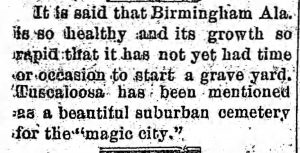
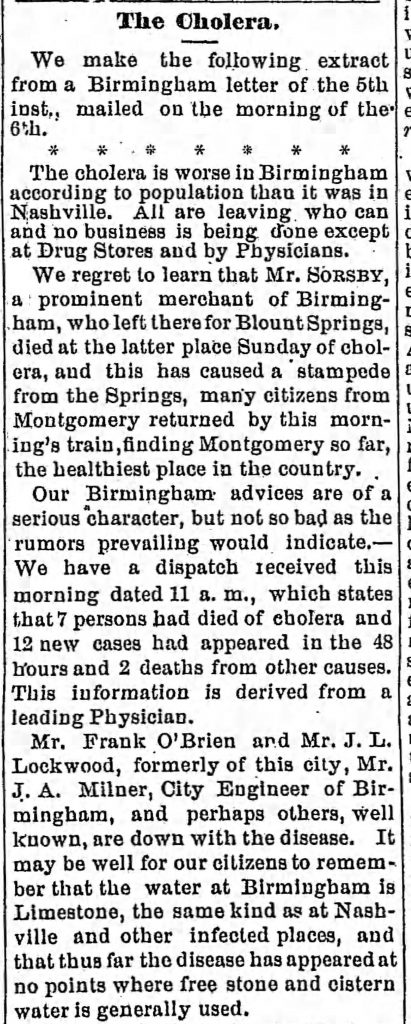

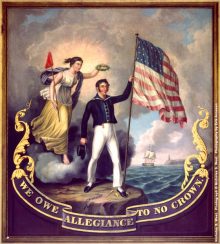
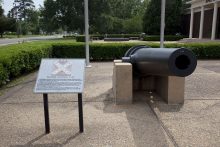
Nice Studebaker